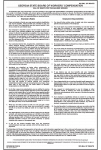Oklahoma Workers’ Compensation Notice Mandatory Update

What’s New? Oklahoma employers and employees are required to meet certain deadlines in the event an employee is injured in the workplace under Oklahoma’s Workers’ Compensation Law (O.S. Title 85A) and the law’s implementing regulations (Title 810). In particular, the law and regulations establish when employees must file claims for benefits for work-related injuries and Read more





